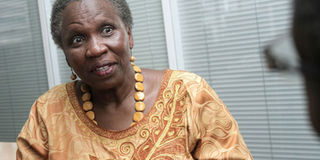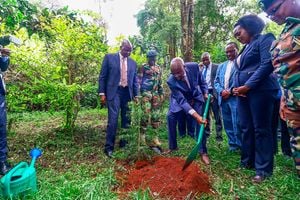The Kenyan feminist praised by president of Malawi as a friend

Former Femnet chairperson Njoki Wainaina speaks during an interview with Sunday Nation on the December 14, 2013. Ms. Wainaina was among the Kenyan women Malawi President Joyce Banda acknowledged during the Kenya at 50 celebrations at the Kasarani Safaricom stadium on Jamuhuri day. PHOTO | EMMA NZIOKA
What you need to know:
- Ms Wainaina was pivotal in both the formation of Femnet — the organisation that takes credit for the resounding success of the meeting that resulted in the Nairobi Forward-looking Strategies for the Advancement of Women.
- Talking to the Sunday Nation on Saturday, Ms Wainaina explained how the roaring success that was the Nairobi conference shook the country’s patriarchal base so much that while other African women left with what they described as ‘the Nairobi Spirit’, then President Moi started using women to destroy the women’s movement.
Members of the dot.com generation assembled at the Kasarani Safaricom stadium for Kenya’s 50th birthday celebrations may have been bewildered by one of the names Malawi President Joyce Banda mentioned when she was given the podium.
It turns out that at that ill-co-ordinated fete, Africa’s only second woman president was ambushed to say a word, and in the process went on to acknowledge “lots of friends here”, who included Njoki Wainaina, Charity Ngilu, and Beth Mugo — starting with Mama Ngina Kenyatta, whom she thanked for an unnamed favour.
While Cabinet Secretary Ngilu and nominated Senator Mugo are well-known political figures, many in the 20-30-age bracket, which forms the UhuRuto support base that thronged Kasarani, must have wondered just who Njoki Wainaina is.
And yet, Ms Wainaina is one of the kingpins of Kenya’s women’s liberation movement, especially from the point of view of the UN Decade for Women Conference held in Nairobi in 1985.
Together with Dr Eddah Gachukia — one of Kenya’s first two nominated women MPs, who served in the Third Parliament — child rights activist, Dr Pamela Kola and Prof Norah Olembo, Ms Wainaina was pivotal in both the formation of Femnet — the organisation that takes credit for the resounding success of the meeting that resulted in the Nairobi Forward-looking Strategies for the Advancement of Women.
Femnet stands for ‘feminine network’, a term coined by Zambian gender analyst and activist Sara Longwe. It was preferred to the mouthful African Women’s Development and Communication Network, which is still the organisation’s official name. Ms Longwe was the Femnet chairperson from 1997 to 2003.
The Femnet story is captured in the recently released book, HerStory, written by Ms Wainaina, who was the organisation’s founding co-ordinator and later chairperson of its board from 1992 to 1995.
Tellingly, the book’s foreword is penned by Malawi President Joyce Hilda Banda, who says in the opening paragraph: “...my own personal, professional and political growth, struggles, challenges and victories have parallels with the FEMNET HerStory. As we reflect on the journey we have come on the last 30 years, we see a clear pattern of growth and development that is reflected in the personal, national, sub-regional and global achievements of the women’s movement.”
It is ironic that although Ms Banda cut her political teeth in Kenya — the same with Liberia’s Ellen Johnson-Sirleaf, who spent 12 years here in exile during the turbulent reign of dictator Samuel Doe, a Kenya woman is yet to get anywhere near State House.
The dismal performances of Mrs Ngilu and Prof Wangari Maathai in the 1997 General Election, followed by the equally poor showing by Ms Martha Karua in the March 2013 elections is a statement of deep prejudice against women’s leadership in Kenya.
Talking to the Sunday Nation on Saturday, Ms Wainaina explained how the roaring success that was the Nairobi conference shook the country’s patriarchal base so much that while other African women left with what they described as ‘the Nairobi Spirit’, then President Moi started using women to destroy the women’s movement.
“Moi was so afraid — he started with Maendeleo ya Wanawake Organisation (the oldest women’s grassroots movement in the country) — to destroy the gains of the women’s conference… The line he used was ‘beware of the elite woman’— and brick by brick, he used Maendeleo to destroy other women.” Maendeleo was in fact co-opted into Kanu, assuming the infamous Kanu-Maendeleo ya Wanawake name.
But she does not spare the Mwai Kibaki government. which she considers as having been the worst for women.
The woman who was pivotal to the formation of the Men for the Equality of Men and Women of retired Presbyterian cleric Timothy Njoya — and similar movements in the southern African region, had a message for the men: “You are the first beneficiaries of the empowerment of women.”
Ms Wainaina is now in a new ministry called Kingdom Building that seeks to address the enigma that although Kenya is said to be more that 80 per cent Christian, there is still much evil in society.
So, how exactly does she relate to the Malawi Head of State? “She is very close to me. The main thing I do for her is to pray.”




